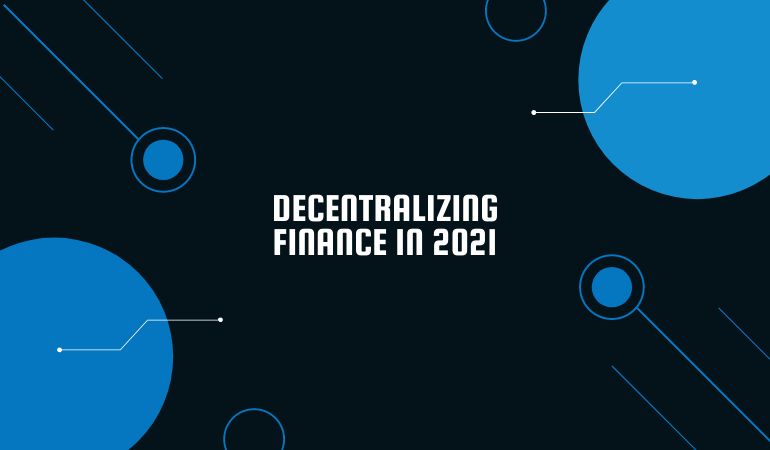

March 18, 2021
Decentralizing finance in 2021
Decentralized finance, which is regularly referred to as DeFi is a contemporary form of finance that circumvents the reliance on one autonomous regulating body, such as financial intermediaries like banks, agents, brokers, and other legal authorities. Decentralized finance instead relies primarily on smart contracts. Smart contracts, like conventional contracts, are signed agreements between two parties that are established in the form of electronic codes rather than a hand-signed signature of acknowledgment.
This concept was originally reinforced to eliminate the need for acquiring the assistance of third parties such as banks, therefore the two subject matters are interdependent as one can not appreciate the concept of Decentralized finance without understanding smart contracts. The algorithm behind smart contracts mandates that conditions are met by both participating parties before the transaction can materialize.
These contracts are advantageous in the sense that they terminate the need for a third party, and ergo accelerate the transaction process. An integral characteristic of these agreements to note is that they are established on a public blockchain but are exclusively unalterable. Therefore, blockchain’s decentralized feature enabled the successful establishment of these contracts. Ethereum, a widely used form of Bitcoin, was first propounded in the year 2015 and pioneered the employment of smart contracts. Smart contracts have been widely enforced in many industries today such as the medical sector, the tertiary sector, and so forth.
A simple illustration of how a smart contract may be implemented to decentralize finance could be: A buyer who is looking to invest in a car can enter into a smart contract agreement with a car dealer. The total owed to the seller is $10,000. The automatic terms of the contract warrant that for the buyer to receive the car, he is to reimburse the money to the car dealer first. The same may be implemented in real estate and would automatically eliminate the need for costly agents and exhaustive administration and paperwork.
However, the entire structure of the smart contracts raises a few concerns. For instance, the fact that the coding behind smart contracts is publicized means that all blockchain users can access these contracts and decode and eventually interpret them, therefore, security concerns may potentially be a threat concerning smart contracts. In retrospect, decentralized finance catalyzes the overall objective of cryptocurrency, which is to simplify and make transactions more accessible on a global scale.








